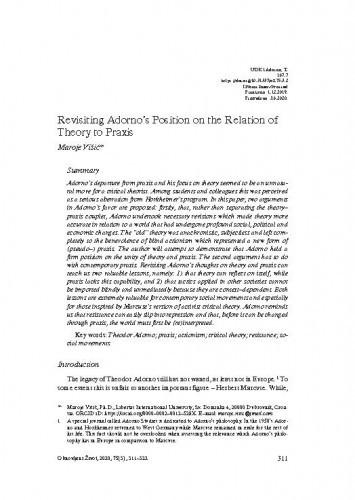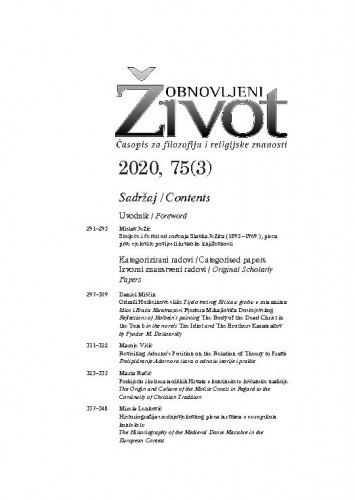Adorno's departure from praxis and his focus on theory seemed to be an unnatural move for a critical theorist. Among students and colleagues this was perceived as a serious aberration from Horkheimer’s program. In this paper, two arguments in Adorno’s favor are proposed: firstly, that, rather than separating the theory– praxis couplet, Adorno undertook necessary revisions which made theory more accurate in relation to a world that had undergone profound social, political and economic changes. The "old" theory was anachronistic, subjectless and left completely to the benevolence of blind actionism which represented a new form of (pseudo–) praxis. The author will attempt to demonstrate that Adorno held a firm position on the unity of theory and praxis. The second argument has to do with contemporary praxis. Revisiting Adorno’s thoughts on theory and praxis can teach us two valuable lessons, namely: 1) that theory can reflect on itself, while praxis lacks this capability, and 2) that tactics applied in other societies cannot be imported blindly and unmediatedly because they are context–dependent. Both lessons are extremely valuable for contemporary social movements and especially for those inspired by Marcuse’s version of activist critical theory. Adorno reminds us that resistance can easily slip into repression and that, before it can be changed through praxis, the world must first be (re)interpreted.; Adornovo napuštanje prakse i akcentiranje primata teorije činilo se nesvojstvenim potezom za kritičkoga teoretičara. Među kolegama i studentima Adornov potez shvaćen je ozbiljnim odstupanjem od Horkheimerova programa. U ovom radu iznose se dva argumenta. Najprije se nastoji pokazati kako kod Adorna nije posrijedi izričito razdvajanje teorije od prakse, nego je riječ o nužno potrebnoj reviziji koja bi trebala iznova aktualizirati teoriju u svijetu koji je prošao kroz duboke društvene, političke i ekonomske promjene. “Stara” teorija bila je anakronistička, bez subjekta i potpuno izručena nerefleksivnomu akcionizmu, koji je predstavljao novi oblik (pseudo)prakse. Zatim se pokazuje da je Adorno zadržao čvrsto stajalište o jedinstvu teorije i prakse. Drugi argument odnosi se na suvremenu praksu. Preispitivanje Adornovih misli o teoriji i praksi može podučiti dvama vrijednim lekcijama: 1. teorija može reflektirati na sebe samu, a praksa nema tu mogućnost; 2. taktike iz drugih društava ne mogu se slijepo i nerefleksivno uvoziti, jer su one određene društvenim kontekstima. Obje lekcije izuzetno su vrijedne za suvremene društvene pokrete, a posebno za one koje nadahnjuje Marcuseova varijanta aktivističke kritičke teorije. Adorno podsjeća da se otpor može lako pretvoriti u represiju i da svijet, prije nego što se može promijeniti praksom, mora biti iznova protumačen.
Sažetak

 Obnovljeni život : časopis za religioznu kulturu : 75, 3(2020) / glavni urednik Tadija Milikić.
Obnovljeni život : časopis za religioznu kulturu : 75, 3(2020) / glavni urednik Tadija Milikić.